A Defense of Deeper Learning Transcript
+++ 01:00:00 +++
Card:
DEEPER LEARNING Elevating Student Thinking and Student Voice
Card:
DEEPER LEARNING COMPETENCIES
Master core academic content
Think critically and solve complex problems
Work collaboratively
Communicate effectively
Learn how to learn
Develop academic mindsets
+++ 01:00:31 +++
Jerica: I'm up here standing, doing a real defense.
Bob Lenz: Deeper Learning pushes you to have kids become collaborators.
Jerica: This means to inquire. Like, that's a good definition of it.
Bob Lenz: To become problem solvers.
Abby Benedetto: How do you know that you're getting to the meaning? The defense is it.
Jerica: Welcome to my College Success Portfolio Defense.
Abby Benedetto: Exhibitions at Metro are authentic demonstrations of knowledge.
Student: Really, really excited to do my defense.
Jerica: Can I have a second?
+++ 01:00:56 +++
Erika Nielsen Andrew: Students who really take on deeper learning, they are transformed by that experience.
Abby Benedetto: You're going to be great.
Nick: All right.
Jerica: This basically decides whether or not you graduate.
Stident: We have reached a decision.
Card:
A Defense of Deeper Learning
Featured organization: Envision Education
Card:
Metropolitan Arts & Tech High School. San Francisco, CA
Lower Third:
Erika Nielsen Andrew
Executive Director Envision Learning Partners
+++ 01:01:18 +++
Erika Nielsen Andrew: To me, deeper learning is both an outcome, what we hope kids can do, which is to demonstrate deeper learning, but it's also a process for how we teach kids to use their minds well. Envision Schools is comprised of four schools, one of which is Metro.
Lower Third:
Bob Lenz CEO/Co-Founder Envision Education
Bob Lenz: The mission of Envision Education is to transform the lives of students by preparing them for success in college and career and life.
Jerica: Good morning everybody, and welcome to my College Success Portfolio Defense.
Nick: My metaphor is a color spectrum.
Lower Third:
Abby Benedetto English Teacher, Advisor, Metropolitan Arts & Tech High School San Francisco, CA
+++ 01:01:47 +++
Abby Benedetto: Exhibitions at Metro are authentic demonstrations of knowledge. Our students are challenged to get up and be proficient at something.
Jerica: The three aspects of soil that I tested were potassium permeability, and phosphorus.
Abby Benedetto: So they have to have their argument and their metaphor, and then with each of the artifacts, the piece of evidence that they're talking about, they have to include what competency that artifact is evidence of.
Jerica: For my third artifact, I will be presenting my Industrial Revolution Research paper.
+++ 01:02:15 +++
Bob Lenz: They need to prepare and defend that in a dissertation style defense, about a 45 minute to hour presentation and Q and A.
Student: What did you do that was hard, that actually involved showing up and contributing to the community that was your group?
Nick: I helped contribute my skills and my thoughts and ideas to others in my group.
Bob Lenz: It's make or break, and so you start testing your own mettle in a high stakes way.
Jerica: I'm mostly proud of my focus and strength that I've had.
+++ 01:02:45 +++
Abby Benedetto: All of the work that we do is mapping backwards from the final moment, which is when a student stands up in front of a panel of assessors to say, I am ready for college.
Jerica: My strength has shown through me not giving up.
Abby Benedetto: And so the defense is it, I mean, they do not graduate if they do not pass their defense. They have multiple times to try, but they do not graduate if they don't pass their defense, even if they pass their classes.
Card:
Four weeks earlier...
Lower Third:
12th Grade English Class
+++ 01:03:15 +++
Abby Benedetto: I'm excited about today because we are going to really try to focus in on the cover letter.
Abby Benedetto: I'm trying to break down the student's writing process through that-- this cover letter. They're asked to write a cover letter that orients their whole defense and that cover letter for some of them is 10 to 22 pages.
Abby Benedetto: When you're talking about each artifact, right, in the artifact description, you have to be relating that artifact to four things.
Abby Benedetto: I found, as I was reading their cover letters, was that they were struggling to weave four really important elements that they need to.
Lower Third:
Argument
Abby Benedetto: Argument, of course, because your artifacts are evidence of your argument.
Lower Third:
Metaphor
Abby Benedetto: Your metaphor, because those two things work together in concert.
Lower Third:
Competency
+++ 01:03:52 +++
Abby Benedetto: And then the competency that that artifact exemplifies, your mastery of, or your proficiency in.
Lower Third:
Leadership Skill
Abby Benedetto: And the leadership skill that you used in order to do that artifact.
Erika Nielsen Andrew: This is at the core of what we do. Like, this is the common core come alive, because it really is all about evidence and claims.
Nick: When you watch a movie, like, throughout the movie, like you see a lot of things, and you analyze these things, and you know, before the movie is over, you can actually tell what is going to happen.
Lower Third:
Nick 12th Grade Student Metropolitan Arts & Tech High School San Francisco, CA
+++ 01:04:20 +++
Nick: My name is Nicholas Ramone [ph?] ____________, and I'm a senior, 12th grade, at Metro Arts & Technology High School.
Nick: Because you looked at the deeper meanings of what was going on throughout the movie, and so you know what's going to happen at the end.
Abby Benedetto: Big puzzle, well done. Well we're all there together, I love it.
Nick: Right now, I would say I'm struggling but I will put that on myself, not the school, because my start here at Metro, you know, like I said, I didn't do none of the work, you know, all I want to do is have fun, play in class, not knowing that this will all fall back on me.
+++ 01:04:55 +++
Abby Benedetto: How do you break something down?
Nick: Thank you.
Abby Benedetto: How do you find the deeper meaning? How do you know that you're getting to the deeper meaning? Think about that a little bit, okay?
Nick: Okay. So--
Abby Benedetto: Oh my gosh, the ninth grade Nick? Well he was rarely in class, because he chose not to come to school. What I loved about his defense is that he's now working out the fact that he did that because he felt like he couldn't do the work, and so it was easier for him to act foolishly or disrupt the learning, or be rude or disrespectful, because that was better than trying and failing.
+++ 01:05:33 +++
Abby Benedetto: What I want you to do is try to have a brief discussion on how to get to the clearest most complete answer to the question, the what question. Okay, so what is analysis, what is inquiry, what is creative expression, what is research.
Bob Lenz: Deeper learning pushes you to have kids become collaborators, to become problem solvers, really do the deeper reflective meta-cognitive work.
Abby Benedetto: We are going to quickly and silently move to the computer lab. When we do so, you are going to sit down at a computer and open up your cover letter.
Lower Third:
12th Grade Computer Lab
+++ 01:06:11 +++
Jerica: Inquiry, this means to inquire, like that's a good definition of it, and then go more into, like, specifically how you use inquiry through your-- through that specific artifact.
Lower Third:
Jerica 12th Grade Student Metropolitan Arts & Tech High School San Francisco, CA
Jerica: My name is Jerica Miles, and I'm a senior at Metro Arts & Tech High School. For, like, the last couple of weeks, we've been working in order to focus on our college success portfolios, because it's pretty much crunch time and we need to get these things done.
Jerica: It takes a lot of work and you have to be, like, prepared to persevere, because things do get hard.
+++ 01:06:49 +++
Abby Benedetto: The students, as they begin to understand how it all works here, they realize they can't rely on the teacher, because the teacher is not up there with them at exhibition, the teacher is not up there during the defense, it's just them. So their voice has to become-- has to come to the forefront. They have to be more involved in their learning process.
Lower Third:
12th Grade Advisory
Abby Benedetto: So we're going to do a quick look around. I don't want to have this take too much time, because we want to make sure that Jerica does have time to do her defense.
Lower Third:
Erika Nielsen Andrew Executive Director Envision Learning Partners
Erika Nielsen Andrew: I think the other part of it, too, is being willing to make room in your daily teaching for students to be reflective about what they can or cannot do. It's very powerful to be in charge of your education, and that comes through being asked to do demanding things and taking stock about where you are relative to them.
+++ 01:07:30 +++
Nick: I feel a little better, because I finally got one artifact proficient.
Jerica: I just feel like I just need to really sit down by myself and just get things done.
Abby Benedetto: Whatever it takes to motivate, you know, like it's hard, especially when that list feels really overwhelming, but you've just got to do it.
Student: Really excited to do my defense, but then there's nerves, too.
Abby Benedetto: At the end of the day, when we do advisory, that's what-- we start with sitting in a circle, we start as sort of human beings coming together as a community, as a family. Then with seniors advisory is very much about college and the portfolios.
Lower Third:
Jerica's Defense Rehearsal
+++ 01:08:05 +++
Abby Benedetto: We are all going to be using the checklist to assess Jerica as if we are on her panel and this is the real deal. Okay, Jerica, it seems like whenever you are ready, the room is ready, so you may start.
Jerica: I haven't really found a way to deal with it, but it's-- the pressure is pretty tremendous because this basically decides whether or not you graduate.
Jerica: Can I have a second?
Abby Benedetto: Yeah.
+++ 01:08:35 +++
Jerica: Can I have a second outside?
Abby Benedetto: Yeah.
Jerica: Thank you.
Abby Benedetto: Okay, Jerica knows she's not ready. She wants to be the most ready when she begins. This is a fine thing to do, to ask for a second.
Abby Benedetto: She had a total meltdown, because sometimes, because of this, like, level of being critical of herself or wanting to be perfect, she sometimes gets wrapped up so tightly that she can't, sort of just let herself be.
Abby Benedetto: Jerica is going to do the best job she possibly can, because she's going to do a great job. And this is just a rehearsal, she's going to do the best she can, and that's all we ask.
+++ 01:09:13 +++
Jerica: Okay.
Abby Benedetto: It's just us.
Jerica: Welcome to my College Success Portfolio Defense. For those of you who don't know me, my name is Jerica.
Card:
Four weeks later...
Lower Third:
Senior Defense Day
+++ 01:09:33 +++
Abby Benedetto: Welcome to the first day of your graduation portfolio defenses. This is the culminating moment of what you have worked on over four years. Today we are going to show our connection of support by creating this web where you sort of are showing to each other how you are going to support and hold each other close in these most important days.
Abby Benedetto: Nick has become a different person in the last four weeks, and it's been remarkable to watch the transformation in him, is one that I think many teachers never get to see.
Abby Benedetto: In here, on Nick's panel is Eileen--
+++ 01:10:12 +++
Abby Benedetto: And last Thursday, he received a call saying that his sister's boyfriend, who is the father of his niece, was shot and killed, and this is a man that he was close to, and looked up to, and at the height of his stress and his commitment to, like, seeing a future for himself. Up until yesterday, he was still really hoping that this was going to be a true defense and that he was going to get it together.
Abby Benedetto: I feel like already I've seen a shift in you, and I, once again, always so impressed with how, just who you are, and who you're becoming.
+++ 01:10:45 +++
Abby Benedetto: At the end of the day yesterday, I was talking to him on the phone, and I said, what's the status, where are we? And he said, "I don't think-- I think it's going to be a rehearsal."
Abby Benedetto: I want you to have the experience of the room seeing how much work you've done, and how far along you are, knowing that you're going to finish it next week, and it's going to be awesome, and you're going to pass.
Nick: Okay.
+++ 01:11:09 +++
Nick: My name is Nicholas _____________, and welcome to my College Success Portfolio rehearsal. Throughout my time at Metro, I became more comfortable with expressing my ideas. This project helped to show the light in me, because during this project, I was able to express my ideas and my skills, and help contribute to my group in order to get this project done.
Student: I loved how you said you got to do stuff more than once when there are high stakes.
+++ 01:11:36 +++
Student: I liked your-- when you went to your growth and successes. I like how you explained them. I think you should put, like strategies on ways to keep maintaining them, or how to make a big change in the future.
Abby Benedetto: But I just really want to appreciate you for getting up there and doing a great job and now you are going to be that much more ready when you go up next week for real. So round of applause for Nick.
+++ 01:12:05 +++
Abby Benedetto: So my whole point was, I'm not worried about you. This is-- you're going to be great.
Abby Benedetto: For Jerica, I think the last four weeks have been her doing what she does best, which is this sort of pointed focus.
Abby Benedetto: Go deep into detail when you need to, zoom out when you need to, and you're going to be great, this is going to be solid. Okay, you ready?
Jerica: Oh, I guess.
Abby Benedetto: You are, you're totally ready.
+++ 01:12:27 +++
Jerica: As a microscope, I am able to see the beauty and detail in what seems to be boring, but really is remarkable. I turned a situation that seems like a whole bunch of work and stress, into a testament of how I could collaborate with other people. I'm up here standing, doing a real defense, doing the best that I know I can. I've just used my focus to keep me on track.
Abby Benedetto: All right, let's give Jerica a huge round of applause.
Card:
Deliberation
+++ 01:13:00 +++
Teacher: Part of my, on the fence is that, while I wished I heard more about growth, part of me is saying we heard a lot about her accomplishments.
Abby Benedetto: Every panel we try to have three staff members and then one student from every grade level represented.
Student: That's one of the most important boxes to me, it's like acknowledging that you grew and that this has changed you in any way.
Abby Benedetto: It absolutely brings it full circle in terms of the deeper learning, because the best moment is when a student is able to take what they've learned about defenses and apply that, when watching a defense.
+++ 01:13:35 +++
Student: So I think that, as far as the panel, and as far as our decision, we have decided that you have passed.
Jerica: Thank you.
Abby Benedetto: Yay, Jerica.
Jerica: Thank you.
Jerica: Extremely proud of myself. I'm doing something that a lot of kids don't really know how to do, so yeah, that makes me really proud.
Abby Benedetto: I'm so proud of you.
Jerica: Thank you, Abby.
Abby Benedetto: Oh I hope you feel good. It was great.
Bob Lenz: These kids are ready to learn, to grow, to be amazing human beings.
Student: It's really impressive.
Jerica: Thank you, Sue Anne [ph?].
+++ 01:14:09 +++
Erika Nielsen Andrew: Students who really take on deeper learning, not only are they prepared for college and life, but they are transformed by that experience.
Card:
One week later, Nick presented his defense.
He passed.
#### End of Envisions_Main.

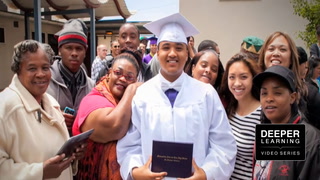
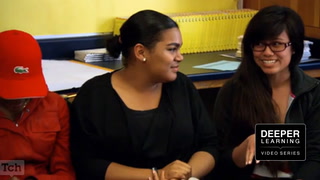
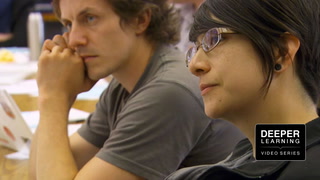
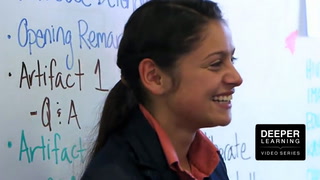
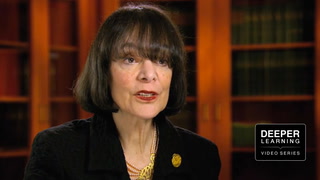








9 Comments
john pate Jul 4, 2022 11:47pm
This video should be a lot longer and go into the details of this more
Kevin Pettit Jul 27, 2020 1:21pm
This method of teaching backwards is excellent. The students know they have to pass their defense in order to graduate. When you have a clear goal in mind and the teachers provide strong scaffolding and guidance throughout the entire priocess, the student is more likely to succeed. Nick reminds me of many of my students and this video shows how a different approach to teaching can provide a much more effective and inspiring educational experience for many students. Around minute 7, the teacher talks about how the students are in charge of their work, thier education, and they can't always rely on thier teacher to help them or do the work for them. The emphasis is on the individual student to get the work done and graduate. At minute 9:20, when Jerrica (sp?) has such a hard time presenting in front of the class was a good thing to include in the video. As a teacher, who hasn't seen this happen? But this shows how you have to struggle in order to succeed. I just like the overall concentration of hard work, struggle and learning to overcome in this.
Tiffany Stanfield Jul 27, 2020 10:14am
Mapping backwards from the defense is the first step. They are taught how to do the cover letter which outlines their defrense and therefore outline what they need to do. They are then able to plan out the steps that they need to take to get the job done. Student growth and maturity in self-reflection and self-monitoring are by-products of the process.Teachers are mentors and can help guide students in their project both academically as well as emotionally. This reminds me of something that was implemented at the high school I taught at up in N. Carolina. I was a mentor for one of my ESL students and helped guide him in the research portion of his senior project. To be honest, it was as if it were one more hurdle for students to jump over to graduate from high school, a hurdle that students who were already dealing with extra difficulties in life probably did not need.
Alexandra McWilliams Jul 26, 2020 11:02pm
They have to have artifacts and metaphors. They have to prepare and defend their dissertation in a lengthy presentation. I like how this allows students to show all that they have learned. The teacher acts as an advisor and mentor for their students.
Debbie Wellslager Jul 26, 2020 5:45pm
There is a step by step process where students learn the elements of their subject matter, work cooperatively with one another, and practice the actual defense in order to work through the process of learning (metacognition), and self confidence needed to actually present the defense. The defense itself allows students to synthesize the materials they have studied and work back through how they intertwine, connect, and support each other. This synthesis gives them expertise at a level thy would otherwise not have. Additionally, articulating and verbalizing the knowledge increases understanding and shows the depth of cognition and growth on the part of the student. The role of the teacher is to advise, mentor, coach, encourage, support and motivate the student towards growth and completion. They are not responsible for the results though, the students are.